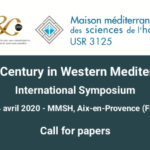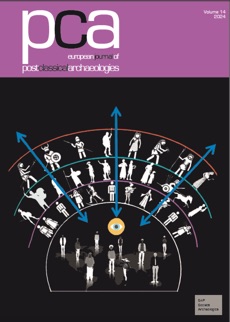The 5th Century in Western MediterraneanInternational Symposium
22-24 avril 2020 – MMSH, Aix-en-Provence (France)
Call for papers
The 5th century is unequivocally identified as a key moment in the history of the Western Mediterranean, marked in particular by the establishment
of the Barbarian kingdoms, the end of the Roman Empire in the West and a new phase of Christianity’s expansion. These are all major, if not fundamental, upheavals that have profoundly and lastingly influenced the evolution of this geographical area.
The political fragmentation of the western Mediterranean has led to new economic dynamics. It has resulted in a reconfiguration of the elites with
the contribution of barbaric military aristocracies, but also in changes in cultural practices and lifestyles. This involved redefining the principle of ‘Romanitas,’ which had structured different aspects of daily life for more than five centuries, particularly around religious affiliations, which were the subject of conflicting debates at that time. Cities and countryside underwent significant changes, which can be seen particularly in the material culture. Wars and political upheavals also increased the number of refugees, giving rise to new diasporas.
Currently data available make it very difficult to form a satisfactory global vision of this century because they are so heterogeneous, dispersed and often
diluted in diachronic approaches.
From this observation emerges the need to gather, cross-reference and compare the extremely abundant information in order to measure the transformations and the space they affect during the 5th century.
An international symposium is undoubtedly the most appropriate tool to approach this issue, given the multiplicity of research teams working in this field
and the scope of the geographical framework concerned. The choice of location for this scientific event is naturally guided by a research dynamic on late antiquity and the early Middle Ages in the Western Mediterranean, deeply rooted in Aix-en-Provence since Paul-Albert Février’s pioneering work.
This conference, which will be held in Aix-en-Provence (France) on 22, 23 and 24 April 2020, at the Maison Méditerranéenne des Sciences de l’Homme (MMSH), will bring together text historians and archaeologists who will be invited to present thematic or regional summaries either in the form of a 25-minute oral presentation or a poster.
To submit a proposal:
Presentations (lectures and posters) must fall within one of the following five themes and focus on either the whole of the western Mediterranean or a particular area of this geographical sector including Dalmatia and Italy, the Iberian Peninsula, Southern Gaul, Malta and the Maghreb as far as Tripolitania:
1/ Migration, mobility, invasions: transformations of populations. From texts to bioarchaeology 2/ Transformations of urban and rural landscapes: habitats, climate, environment
3/ Productions, traffic, networks: economic transformations
4/ Transformations of society: emergence of new elites and evolution of social relations
5/ Political, religious and military powers: new material and cultural expressions
Proposals must be sent before 15 december 2019 to the following address: medoc5@mmsh.univ-aix.fr
They should include both for lectures and posters:
– A title (provisional or definitive)
– The name of the author(s)
– A summary of about 3000 characters (or 500 words) – The indication of the theme of the lecture or poster
The proposals will be selected at the end of 2019 by the Scientific Committee on the basis of their relevance to the themes of the symposium and their scientific ambition. 20 papers and 25 posters will be selected.
Because of the major scientific impact that this event will have, given the high expectations at international level, it is important that information be disseminated very quickly. Preliminary documents will be available before the opening of the conference in both paper and digital form, accessible via a dedicated website. This will be followed by a paper publication containing all the contributions and debates. Participants will be asked to provide their text by 31 July 2020.






